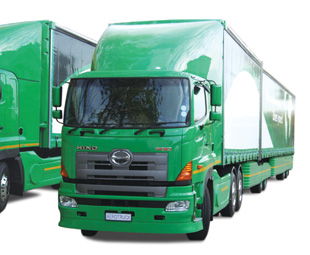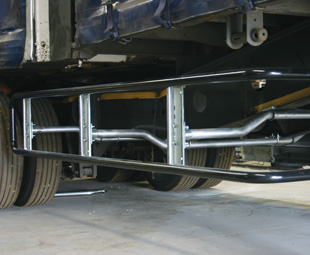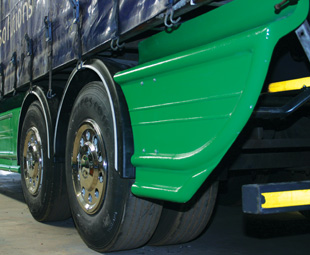Advancing aerodynamics

Local truck aerodynamic system manufacturer Aero Truck has launched a trailer under-run protection and wind management kit that bolts onto trailers and rigid trucks: a first in the country.
Aero Truck started manufacturing truck aerodynamic systems in 1986 as a local alternative to imported kits that were both expensive and inadequate, mainly because South African heavy vehicle trailer sizes differ from those of Europe and the USA.
Now Aero Truck has unveiled a special prototype, fully designed and manufactured in-house. These new under-run chassis skirts have been developed on an Afrit Superlink tautliner for Barloworld Logistics.
The unit has been designed to bolt on, therefore no drilling or welding is required when fixing it to the trailer chassis, and is adjustable to fit any make of trailer including those fitted with super-single tyres.
The kit is made up of goose-necked cross pipes that are clamped onto the chassis rails. This allows for differing chassis widths and also, by rotating the pipes, permits height adjustment.
Slotted plates hold the side protection rails to the cross members. These are quite substantial, and any side impact forces will be absorbed by both chassis rails.
 The fibreglass covers can be fitted onto the side protection rails if improvement aerodynamics is required. If wind deflection is not needed, the tubes can be supplied powdercoated, galvanised or in stainless steel for additional bling. The kit can be easily fitted in-house by any competent workshop.
The fibreglass covers can be fitted onto the side protection rails if improvement aerodynamics is required. If wind deflection is not needed, the tubes can be supplied powdercoated, galvanised or in stainless steel for additional bling. The kit can be easily fitted in-house by any competent workshop.
On the launch trailer, Barloworld has again adopted the policy of achieving maximum wind management around the trailer (see World’s first Green Interlink Trailer – FOCUS July 2010). A nose-cone has been developed that can be fitted to the tautliner in conjunction with a cab-mounted aerokit.
The cone is designed for full trailer width while simultaneously allowing room for the curtains to clip on. The gap between the trailers has also been closed, which reduces turbulence between the trailers.
A roof spoiler fitted at the rear of the trailer deflects wind downwards behind the trailer, while a scoop at the bottom of the trailer deflects the wind upwards. The combined effect of this channeling serves to reduce the vacuum, and thus the drag on the rear of the trailer, which forms a significant component of the drag coefficient on cube-shaped vehicles. Mudguards and wheel caps are provided to reduce turbulence around the wheels.
The rationale behind this development is two-fold: improved aerodynamics and improved safety, both of which benefit not only the environment, but also the operator’s costs. As commented by Jan Haag of Afrit Trailers: “The concept behind this development is 100% tried and tested as these kits are used freely on UK and European trailers. For improving wind resistance especially, it is a winner. The kit looks good, and the fact that it is a bolt-on kit is a great feature.”
 Education and the acceptance of new developments are crucial to the improvement of road transport in South Africa. Economics play an important part but cost savings are often not obvious. The fuel-saving benefits of improved aerodynamics are now apparent to the majority of truck operators.
Education and the acceptance of new developments are crucial to the improvement of road transport in South Africa. Economics play an important part but cost savings are often not obvious. The fuel-saving benefits of improved aerodynamics are now apparent to the majority of truck operators.
However, as Cameron Dudley-Owen, director of Aero Truck, says, today’s operators need to be conversant with full lifecycle costs, and this obviously must include the costs of accidents. “Accidents on South African roads cost the country billions of rands annually – not only in terms of damage to vehicles and infrastructure, but also in terms of lost lives.”
He adds that side under-run bumpers of the kit can also contribute substantial savings over time since they reduce collateral damage to the operator’s vehicle as well as any other vehicle involved in an accident.
The fitment of mudguards and mudflaps – a legal requirement in Europe and the UK, but often seen as an unnecessary expense in South Africa – can lead to significant savings and improve road safety for other road users. Further cost savings can be achieved in terms of keeping the vehicle clean, the repairs required to paintwork due to sandblasting, and collateral damage to other vehicles from, for example, flying stones cracking windscreens.
If the road transport industry is to improve, says Dudley-Owen, it will have to strive to be ethical, improve efficiencies and road safety, and protect the environment. The industry shouldn’t wait for legislation before implementing positive change.
Published by
Focus on Transport
focusmagsa



